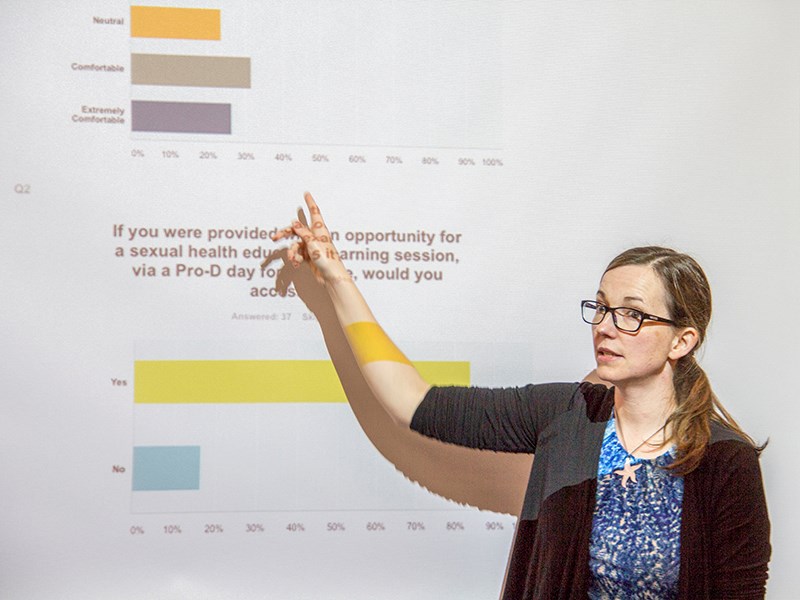Talking, asking and learning about the sexual health of Powell River youth occupied family physician Leta Burechailo’s time for an entire year. She discovered the subject can be charged, challenging and often personal.
From April 1, 2015, to March 31, 2016, Burechailo conducted the youth-focused Enhancing Sexual Health Education and Care (ESHEC) pilot project with the support and participation of School District 47. On Tuesday, April 19, she presented a final report to school board trustees.
“Dr. Burechailo delivers difficult subject matter using plain language in a way that resonates with her student audiences,” said school district superintendent Jay Yule.
Burechailo’s presentations connected with more than young people. Equally important is the education of parents, family physicians, nurses and people working with youth, such as case workers, social workers and teachers.
“The project was basically to have a look at youth sexual health and education in the community, learn about it and then, through the presentation and surveys, improve access to education for kids, youth and young adults, and also the people invested in their lives,” said Burechailo.
ESHEC arose from Burechailo’s work at Vancouver Coastal Health’s Powell River Youth Clinic. Through that interaction she said she gained insight into young peoples lives and their health issues.
“The first key learning from the project was that people’s shared vulnerability and discomfort often came from a misunderstanding about what sexual health is,” said Burechailo. “Consistent and comprehensive conversations help promote healthy and responsible behaviours. They can reduce rates of sexual risk-taking, unplanned pregnancy, infection, sexual abuse and assault, and gender- and orientation-based harassment.”
In a presentation to the school board, Burechailo reported that her research indicates Powell River youth have similarities and differences to other rural Canadian youth.
“Rural Canadians bare the burden of higher negative sexual health outcomes,” said Burechailo. “In Powell River we have higher rates, higher than provincial averages, of some sexual risk behaviours and sexual health outcomes.”
One noteworthy comparison to other rural communities, however, found Powell River’s teen birthrate at its lowest rate ever.
For its part, the school district wants to continue the discussion with students, parents, teachers, doctors, nurses and caregivers.
“Our pilot has had strong reviews from all our stakeholders, so we have committed ongoing funding and support for the proposed program for next year,” said Yule.
ESHEC did not begin with solutions, said Burechailo. The project started with a lot of questions and ended with a lot of questions still to be answered, she said.
Among the groups involved in youth sexual education and health, Burechailo wants to broaden the knowledge of parents, who have the most influence on sexual behaviour.
“As I tell parents in my learning sessions, keep talking, at least one conversation a week,” she said. “Kids have questions, even if they’re not asking them, and there’s lots to talk about. Discuss music lyrics and videos, movie characters, schoolyard chatter, magazine covers in grocery store lineups and personal values; talking sometimes needs a little momentum to get it going, but it gets easier the more you do it.”



